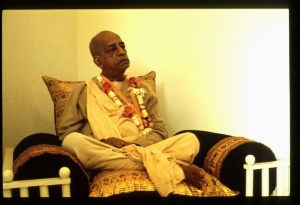CC Madhya 7.101 (1975): Difference between revisions
(Vanibot #0027: CCMirror - Mirror CC's 1996 edition to form a basis for 1975) |
(Vanibot #0020: VersionCompareLinker - added a link to the Version Compare feature) |
||
| Line 2: | Line 2: | ||
<div style="float:left">'''[[Sri Caitanya-caritamrta (1975)|Śrī Caitanya-caritāmṛta (1975)]] - [[CC Madhya (1975)|Madhya-līlā]] - [[CC Madhya 7 (1975)|Chapter 7: The Lord Begins His Tour of South India]]'''</div> | <div style="float:left">'''[[Sri Caitanya-caritamrta (1975)|Śrī Caitanya-caritāmṛta (1975)]] - [[CC Madhya (1975)|Madhya-līlā]] - [[CC Madhya 7 (1975)|Chapter 7: The Lord Begins His Tour of South India]]'''</div> | ||
<div style="float:right">[[File:Go-previous.png|link=CC Madhya 7.100 (1975)|Madhya-līlā 7.100]] '''[[CC Madhya 7.100 (1975)|Madhya-līlā 7.100]] - [[CC Madhya 7.102 (1975)|Madhya-līlā 7.102]]''' [[File:Go-next.png|link=CC Madhya 7.102 (1975)|Madhya-līlā 7.102]]</div> | <div style="float:right">[[File:Go-previous.png|link=CC Madhya 7.100 (1975)|Madhya-līlā 7.100]] '''[[CC Madhya 7.100 (1975)|Madhya-līlā 7.100]] - [[CC Madhya 7.102 (1975)|Madhya-līlā 7.102]]''' [[File:Go-next.png|link=CC Madhya 7.102 (1975)|Madhya-līlā 7.102]]</div> | ||
{{CompareVersions|CC|Madhya 7.101|CC 1975|CC 1996}} | |||
{{RandomImage}} | {{RandomImage}} | ||
==== TEXT 101 ==== | ==== TEXT 101 ==== | ||
<div class="verse"> | <div class="verse"> | ||
:yāre dekhe, tāre kahe, | :yāre dekhe, tāre kahe,--kaha kṛṣṇa-nāma | ||
:ei-mata | :ei-mata 'vaiṣṇava' kaila saba nija-grāma | ||
</div> | </div> | ||
| Line 25: | Line 24: | ||
<div class="translation"> | <div class="translation"> | ||
These empowered people used to request everyone and anyone-whomever they saw-to chant the holy name of Kṛṣṇa. In this way all the villagers would also become devotees of the Supreme Personality of Godhead. | |||
</div> | </div> | ||
| Line 33: | Line 32: | ||
<div class="purport"> | <div class="purport"> | ||
In order to become an empowered preacher, one must be favored by Lord Śrī Caitanya Mahāprabhu or His devotee, the spiritual master. One must also request everyone to chant the mahā-mantra. In this way, such a person can convert others to Vaiṣṇavism, showing them how to become pure devotees of the Supreme Personality of Godhead. | In order to become an empowered preacher, one must be favored by Lord Śrī Caitanya Mahāprabhu or His devotee, the spiritual master. One must also request everyone to chant the mahā-mantra. In this way, such a person can convert others to Vaiṣṇavism, showing them how to become pure devotees of the Supreme Personality of Godhead. | ||
</div> | </div> | ||
Latest revision as of 19:13, 27 January 2020

A.C. Bhaktivedanta Swami Prabhupada
TEXT 101
- yāre dekhe, tāre kahe,--kaha kṛṣṇa-nāma
- ei-mata 'vaiṣṇava' kaila saba nija-grāma
SYNONYMS
yāre dekhe—whomever he meets; tāre—to him; kahe—he says; kaha kṛṣṇa-nāma—kindly chant the Hare Kṛṣṇa mantra; ei-mata—in this way; vaiṣṇava—devotees of the Supreme Personality of Godhead; kaila—made; saba—all; nija-grāma—his own village.
TRANSLATION
These empowered people used to request everyone and anyone-whomever they saw-to chant the holy name of Kṛṣṇa. In this way all the villagers would also become devotees of the Supreme Personality of Godhead.
PURPORT
In order to become an empowered preacher, one must be favored by Lord Śrī Caitanya Mahāprabhu or His devotee, the spiritual master. One must also request everyone to chant the mahā-mantra. In this way, such a person can convert others to Vaiṣṇavism, showing them how to become pure devotees of the Supreme Personality of Godhead.